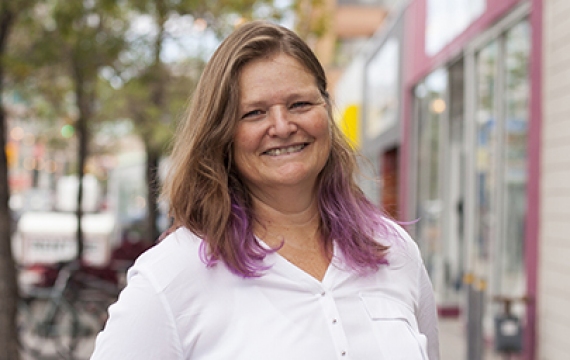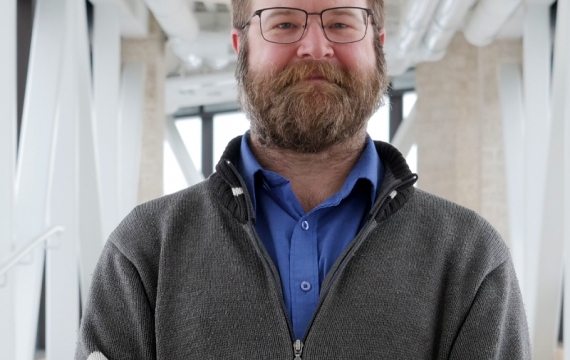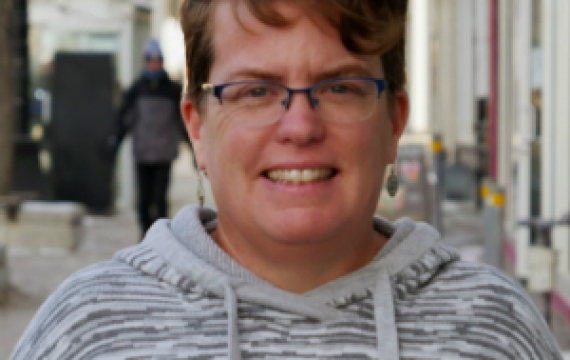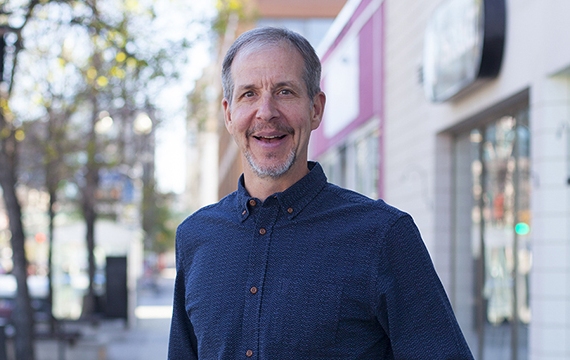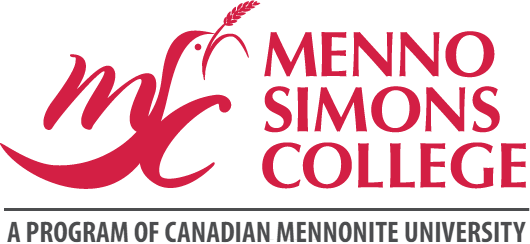
Canadian Mennonite University offers two areas of study, Conflict Resolution Studies (CRS) and International Development Studies (IDS), through its Menno Simons College (MSC) program in affiliation with the University of Winnipeg.
All courses offered through the MSC program are fully integrated into the Bachelor of Arts curriculum at the University of Winnipeg and are open to University of Winnipeg students. Through the MSC program, Canadian Mennonite University endeavors to build an intentional learning community for students interested in issues of peace, community development, and social justice.
Conflict Resolution Studies
Conflict Resolution Studies (CRS) teaches about the nature and dynamics of human conflict. CRS prepares students to understand and interact constructively in response to personal, local, and global conflict situations.
The CRS program is an interdisciplinary major that explores topics of violence, power, justice, peace, communication, culture, war, conflict transformation, and dispute resolution. Through lectures, skill building workshops, and practicum opportunities, students will discover alternative ways to develop healthy relationships and prevent violence.
Note: As of June 30, 2023, no students will be admitted into the four-year Conflict Resolution Studies program. The four-year program is being discontinued. Current students pursuing the four-year degree will be able to complete their program of studies. The three-year program in CRS will continue to be offered. Most courses will be offered online and some courses may be offered in-person at offered at the University of Winnipeg or at CMU.
Programs
- Bachelor of Arts | 4 Year – Conflict Resolution Studies (returning students only)
As of June 30, 2023, no students will be admitted into the four-year Conflict Resolution Studies program. The four-year program is being discontinued. Current students pursuing the four-year degree will be able to complete their program of studies. Most courses will be offered online and some courses may be offered in-person at offered at the University of Winnipeg or at CMU. - Bachelor of Arts | 3 Year – Conflict Resolution Studies
The three-year CRS major is designed to serve students with an interest in conflict resolution who intend to pursue related professional degrees, such as law, journalism, nursing, education, etc. A degree with a CRS major will also support you in attaining an entry level position in the field. Most courses will be offered online and some courses may be offered in-person at offered at the University of Winnipeg or at CMU. - Bachelor of Arts | Minor – Conflict Resolution Studies
The minor in Conflict Resolution Studies is designed to serve students with as interest in issues of peace and justice who are completing majors in a complementary field such as Business Administration, International Development Studies, Gender Studies, Rhetoric and Communication, etc. Most courses will be offered online and some courses may be offered in-person at offered at the University of Winnipeg or at CMU.
For more information please visit the links below which will open a new browser window and take you to the University of Winnipeg website for current CRS course information:
- University of Winnipeg – Conflict Resolution Studies
- University of Winnipeg – Timetable and Registration Materials (see the "Conflict Resolution Studies" section for course offerings)
International Development Studies
International Development Studies (IDS) is an interdisciplinary major that challenges students to explore the causes and consequences of processes that promote some individuals, communities, and nations, and exclude others. IDS students are prepared for citizenship in an increasingly interdependent global community and are encouraged to envision paths towards a transformed, just world. The IDS program focuses on development processes at the global, national and community levels, but gives particular emphasis to development at the community level and to the work of non-governmental organizations and popular movements.
Note: As of June 30, 2023, no students will be admitted into the three-year or four-year International Development Studies program. The IDS program is being discontinued. Current students majoring in IDS will be able to complete their program. Most courses will be offered online and some courses may be offered in-person at the University of Winnipeg or at CMU.
For more information please visit the links below which will open a new browser window and take you to the University of Winnipeg website for current IDS course information:
- University of Winnipeg – International Development Studies
- University of Winnipeg – Timetable and Registration Materials (see the "International Development Studies" section for course offerings)
More Information
To learn more about Conflict Resolution Studies and International Development Studies at Menno Simons College, please contact River Woods, MSC Academic Advisor, at rwoods
Menno Simons College Students Association
For information about the Menno Simons College Students Association (MSCSA), email mscsacontact
History of Menno Simons College

The Founding of Menno Simons College
Menno Simons College began in the 1970s with a vision from a group of Mennonite community leaders who formed the Friends of Higher Education. They had a passion to bring concepts of justice, peace and international development to a university setting. Dr. David Friesen was a driving force in the establishment of Menno Simons College, as a major benefactor and founding chair of the board.
What's in a Name?
Menno Simons College is named after Menno Simons, a 16th-century Dutch priest who became a leader within a radical religious group of "re-baptizers" or Anabaptists. In his writings, Menno Simons reinforces the key values of Anabaptism: complete discipleship, a strong sense of community and an absolute rejection of violence to solve problems in the church or society.
An Academic Institution
In June 1982, the Manitoba Legislature passed Bill 34 granting Menno Simons College a charter to grant degrees. Since then, Menno Simons College has enjoyed tremendous growth. By 1988, Menno Simons College had become known as the home of Conflict Resolution Studies and International Development Studies and the college formally affiliated with a major public university, The University of Winnipeg.
In 1989, Menno Simons College offered its first credit courses with teaching president, George Epp, PhD and one full-time professor, Bernie Wiebe, PhD Dr. George Richert became the second President of MSC and in the mid-1990s, under the leadership of Dr. George Epp, Menno Simons College joined Canadian Mennonite Bible College and Concord College as a founding college of Canadian Mennonite University (CMU). Menno Simons College served as the downtown campus of Canadian Mennonite University.
Governance and Leadership
In 1998, Rev. Jack Loepp succeeded Dr. Friesen as board chair and continued until 2003, when Canadian Mennonite University merged its three-fold administration into one, installing its first president, Gerald Gerbrandt, PhD and appointing one governing board. Throughout the mid-2000s, CMU developed a new administrative structure, including a Vice-President Academic who oversees all academic matters throughout the institution and four academic deans.
Menno Simons College and the University of Winnipeg
In 2005, Menno Simons College purchased the first two floors at 520 Portage Ave. with the intention of renovating the space into a brighter and more welcoming facility. These major renovations took place in the spring of 2012 and included three classrooms, a one thousand square foot student lounge, and an open concept reception, student services, and administrative offices.
Menno Simons College programming specialized in Conflict Resolution Studies and International Development Studies. Visiting scholars, students from foreign countries and many academic disciplines contributed to a vibrant, diverse college community. Menno Simons College operated as a program centre of CMU with an affiliation with the University of Winnipeg.
Restructuring
As of June 30, 2023 the MSC campus at 520 Portage Ave., including first-floor reception, classroom, and boardroom, as well as second-floor offices and classrooms are clsosed to the public. Faculty and staff were moved to the Canandian Mennonite University campus located at 500 Shaftesbury Blvd. Faculty continue teach CRS and IDS classes to University students at the Univesity of Winnipeg campus and online.



 Print This Page
Print This Page